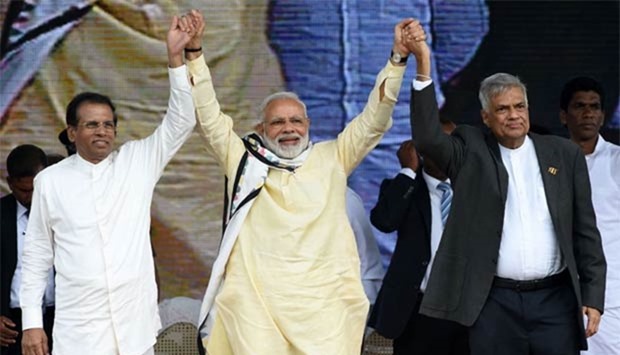Indian Prime Minister Narendra Modi declared on Friday his desire for a "quantum jump" in relations with Sri Lanka, as New Delhi jostles with regional rival Beijing for influence in the island nation.
India had always considered its smaller neighbour to be within its sphere of influence but watched Sri Lanka drift closer to China under former strongman President Mahinda Rajapakse.Modi's visit to Sri Lanka -- his second since coming to power in 2014 -- is being seen as New Delhi's attempt to win back support and counter Beijing's push for closer ties with the Indian Ocean nation.
"I believe we are at a moment of great opportunity in our ties with Sri Lanka. An opportunity to achieve a quantum jump in our partnership across different fields," Modi told a Buddhist conference in Colombo.
His comments came as Sri Lanka rebuffed a Chinese request to dock a submarine at one of its ports.
Chinese-backed projects soared under Rajapakse, who relied heavily on Beijing for economic and diplomatic support as Western nations threatened his administration with sanctions over atrocities committed during the decades-long civil war which ended in 2009.
Sri Lankan President Maithripala Sirisena came to power in January 2015 promising to review Chinese-funded projects signed by his predecessor and rebuild ties with India.
Modi pledged India's commitment to their "Sri Lankan brothers and sisters" and the "indivisible" ties between the two neighbours.
"We will continue to invest in driving positive change and economic growth to deepen our development co-operation," he said.
As Modi touched down in Colombo for a two-day visit Thursday, a top Sri Lankan defence official confirmed Beijing had been denied permission for a port call by a Chinese submarine.
In Beijing, China's foreign ministry spokesman Geng Shuan said they were aware of the reports, but stressed both sides maintained "good cooperation".
"China and Sri Lanka enjoy good friendship," he said.
Sri Lankan Prime Minister Ranil Wickremesinghe's office announced he will travel to Beijing on Saturday to participate in China's maritime silk route initiative of economic diplomacy.
"Attention will be paid to the collective benefits for the countries participating in the initiative of President Xi Jinping," Wickremesinghe's office said in a statement on Friday.
Pro-China Rajapakse's political allies had called for a black flag protest during Modi's visit to Sri Lanka, accusing India of trying to grab land in a strategic port district.
But the former president sought a meeting with Modi on Thursday night and the two had a "cordial" discussion, confirmed Indian diplomats who provided no further details.
Modi flew to the island's tea growing central district of Nuwara Eliya on Friday to open an India-gifted hospital and address tens of thousands of plantation workers of Indian origin.
The nearly one million ethnic Tamils in central Sri Lanka are descendants of indentured labour brought to work in coffee, rubber and tea plantations by British colonial rulers in the 19th century.
"As some of you may have heard, I have a special association with tea," he told workers, referring to his modest beginnings selling tea in the Indian state of Gujarat when he was a child.
"It is a tremendous honour to be the first Indian Prime Minister ever to visit this beautiful region of Sri Lanka."
He promised another 10,000 houses in addition to the 4,000 that India is currently funding for ethnic Tamil plantation workers who are among the poorest in the country of 21mn.
He left on Friday evening after receiving a special blessing at the temple of the Tooth, Sri Lanka's holiest Buddhist shrine, in the town of Kandy.

